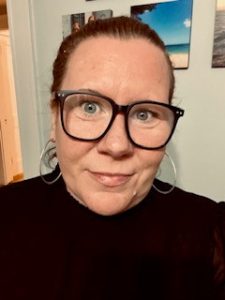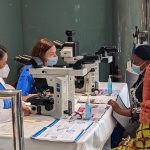Breast Cancer Survivor Reflects on See, Test & Treat
Diane Duggan, a 47-year-old living in the Boston area, spent nearly 30 years as a childcare provider, looking after the needs of children and being an integral part of their families’ homes. Unfortunately, due to a lack of insurance and other barriers to care, Diane had no health care home of her own.

Diane Duggan, patient at CHA See, Test & Treat program.
That is, before she was connected with services through CAP Foundation’s See, Test & Treat® and Cambridge Health Alliance (CHA), a health care system serving the communities just north of Boston.
Still in the throes of the pandemic in 2020, Diane said she delayed finding a primary care provider but received a call from CHA in September 2021 asking if she’d like to sign up for their See, Teat & Treat program in October of that year. The program would provide free breast and cervical cancer screening among other services.
“And I thought, ‘Oh my gosh yes, I definitely would,’” Diane said. “A friend of mine had just been diagnosed with stage four breast cancer … and it was really shocking.”
Welcomed at See, Test & Treat
Diane explained that she was not quite sure what to expect before attending the See, Test & Treat program, but several of her close friends had recently gone through health scares and it seemed like a good idea to take advantage of the free screenings.
“I showed up and it was a sea of volunteers in these great, bright T-shirts, the friendliest people I’ve ever met in my life who were just so kind, so just willing to help you,” Diane said of her experience at the CHA See, Test & Treat.
She added, “You can talk to anyone about anything—they helped me get insurance that day.”
The services offered at See, Test & Treat vary between location, but the majority of host institutions partner with other onsite departments or local nonprofits to provide a variety of health, social, and educational services. Not only was Diane able to be screened for breast and cervical cancer, but CHA financial services professionals helped her find an insurance plan that would work for her and become a regular patient at CHA for scheduled exams, mental health services, and more.
Diane explained that while she was a little nervous about the results of her screening, she came away from the event with a sense of relief and optimism. She had done self-checks at home, but had never received a mammogram, she said. The US Preventive Services Task Force recently updated their guidelines to recommend women start being screened for breast cancer at the age of 40.
She said, “I left there just so filled with happiness, which was crazy because I just left a doctor’s office.”
Timely Diagnosis and Treatment
Fortunately, Diane had not waited any longer to be screened, as the clinicians at CHA reported seeing microcalcifications in her mammogram that would require a biopsy.
In early November 2021, Diane was diagnosed with ductal carcinoma in situ (DCIS), which is one of the more common—and thankfully treatable—forms of breast cancer. While there were cancer cells present, doctors were confident that the disease had not yet spread beyond the walls of the ducts into breast tissue.
“I know that it was handled very well, and I felt very confident after receiving the news,” Diane said. “I felt like OK there’s a plan in place, they know what they’re doing. I just have to show up and everything will be OK.”
Clinicians at CHA got to work building a treatment plan, which would consist of a lumpectomy followed by radiation therapy.
After a lumpectomy in mid-December 2021, no invasive carcinoma was found. Diane said, “I felt elated that it was out of my body, and I was ready for the next phase of [treatment].”
From here, clinicians continued with 20 rounds of radiation therapy over four weeks. The treatment course was set, and Diane completed her radiation therapy several months later after which her cancer was deemed to be in remission.
Diane remembers receiving a holiday card from her care team in the months after her treatment. “It felt to me like I was a celebrity,” she said. “For the first time in my health care experience, I didn’t feel like a second-class citizen because I didn’t have insurance and I didn’t have primary care.”
Rebecca Osgood, MD, FCAP, lead pathologist for the CHA See, Test & Treat program, said, “Without this program, many underserved or uninsured women may not have had the chance to have breast and cervical cancer screening and the opportunity for early detection of common cancers.”
Regular Screening and Family History
Despite her scares and successes with her breast cancer diagnosis, in many ways Diane’s health care journey was now truly beginning. She receives a screening every six months to help ensure her cancer does not return, but she can now also take comfort in a health care home.
“I want to take care of this body that’s taken care of me, because without it I’m nothing,” Diane explained and said prior to this experience she would often put work and other concerns over her own needs.
Through the services she receives through CHA and her new health insurance, Diane regularly sees a primary care physician instead of only visiting an emergency room or clinic when she’s feeling extremely sick.
Also, she’s been able to better process her experience with cancer through mental health services offered through CHA in which counselors helped work through fears and anxieties following her illness.
Finally, she learned key information about her genetic makeup and family history that helped explain her cancer diagnosis. Genetic testing discovered a CHEK2 mutation, which can mean a predisposition to these types of cancers. Upon this discovery, Diane is undergoing high-risk screening for recurrent breast cancer through alternating mammogram and breast MRI every six months.
Diane said she wants to be an advocate for other women who may face barriers to care or may not know the risks of not seeking regular health care and screening.
“I’ve realized going through this program, people die from undiagnosed cancer,” she said. “The most early detected cancers are now treatable.”
If you are interested in hosting a See, Test & Treat program at your health care institution in 2024, the CAP Foundation will accept applications beginning June 30 until September 1, 2023.
Special thanks to Rebecca Osgood, MD, FCAP, who is the lead pathologist for Cambridge Health Alliance See, Test & Treat and interviewed Diane Duggan for this article.


